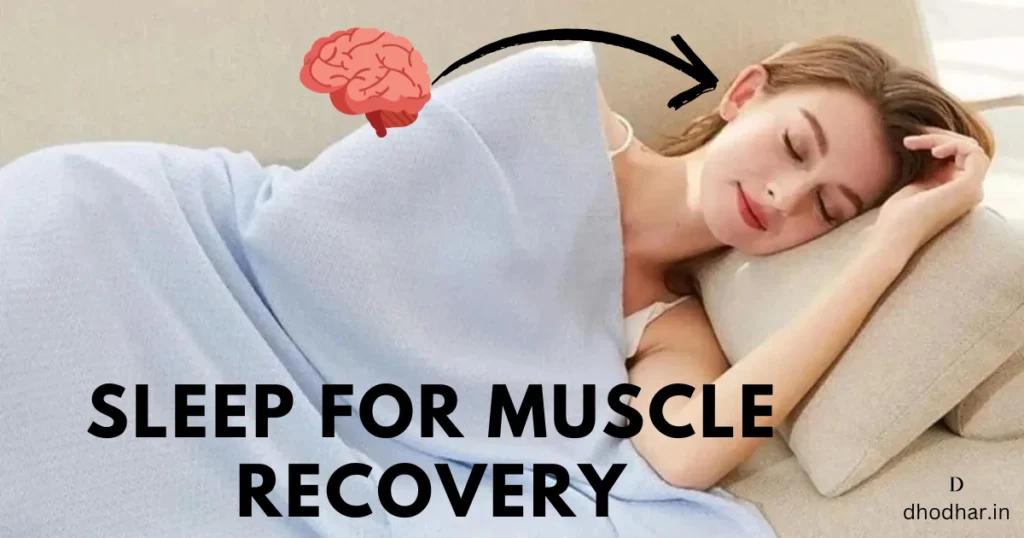Discover why sleep for muscle recovery is key to gains. Learn the science, hacks, and benefits of rest for stronger muscles in this in-depth guide!
Why Sleep for Muscle Recovery Is Your Secret Weapon
Sleep for Muscle Recovery: Have you ever pondered why you feel that your gym gains seem stagnant despite you giving your best shot at workouts? You might be missing the real sleep MVP. Yes, hitting the gym is important but your body does the real work during sleep. Catching sleep for muscle recovery is no longer a luxury; it’s a world of wishes. Worry not because today we explain why catching those Zs could be your magical potion when it comes to achieving fitness levels.
The Science Behind Sleep and Muscle Recovery
Visualize this: Imagine yourself post workout with the ultimate pump coming from the game where spicy fried chicken and muscles combined (of course skill and beauty was needed too). All the proteins are ready to be demolished and muscles are screaming. After this, you have gained some endless muscle fibers and shredded those good fats. Now tears need to be healed and that’s why sleep acts like a superman. The moment you are out cold, your muscles overdrive the protein synthesis, where the you gets and bust the shed continuously reconditioning and fortifying!!! (Exagerated muscle voice intended) those burned tiny muscles into more powerful stuff.
Research suggests that 70-80% of your human growth hormone (HGH)—an essential component of muscle recovery—gets released while you’re in deep sleep. Cut back on rest and you’re setting yourself up to lose progress. But there’s more: sleep also decreases the level of cortisol, that troublesome stress hormone that’s hostile to muscle tissue when left unchecked. Therefore, if bulking or toning is your obsession, deep restorative sleep becomes essential for muscle recovery.
How Much Sleep Do You Really Need?
Let’s put it bluntly: what is the ideal time range? Adults, on average, should shoot for anywhere between seven to nine hours of sleep. If you are particularly active, aim higher. Foster and body builder also place additional demands on their bodies, thus requiring extra rest. For example, a 2011 study discovered that basketball players performed better when sleeping 10 hours per night. They also recovered faster.
Need more convincing? Every outstanding muscular recovery time is delayed by up to 20%. That’s a wasted opportunity for chiseling those biceps or boosting your quads. So, put that alarm clock on the other side of the room to ensure you wake up on time—your muscles will appreciate it.
The Stages of Sleep That Supercharge Recovery
Recovery is not merely a long nap—it’s a combination of different and essential phases. And these phases contribute toward muscle recovery in unique ways. Here’s how:
Light Sleep (Stage 1 & 2): Your body begins to warm up for the extensive work (lifting) to be done in the recovery phase.
Deep Sleep (Stage 3): This is perhaps the most productive sleep grade. Muscle provide much more blood and oxygen nutrient delivery for healing as well as HGH bringing repair materials started feeding systems, looting places where they can be found.
REM Sleep: Although this phase is primarily for cognitive restoration, it also maintains the readiness of your nervous system so that your next workout is not executed carelessly.
If you skip deep sleep, you deny your muscles their
Why Skimping on Sleep Sabotages Your Gains
Let’s think this through. What occurs when you do not give sufficient attention to sleep for muscle recuperation? Spoiler: it’s ugly. Inadequate sleep ruins your testosterone (another muscle-building hormone), lowering it by some 10-15% in just a few short nights. It also increases inflammation which makes you dull and increases sleepiness.
Consider trying to lift heavy the day after an all-nighter. All aspects of performance seem dull. Your strength tanks, your attention fades, and the chances of getting injured surge. One study revealed that fatigued athletes stood a 60% greater chance of muscle strains. So, staying up late may seem like a good idea, but all those ‘work’ sessions in the gym went to waste.
5 Sleep Hacks to Boost Muscle Recovery
Let’s get your sleep enhancement rest to recovery ratio tuned right. Here are five actionable steps to help you unlock the perfect blend of sleep and productivity:
Start With A Daily Goal: Set a reminder to sleep and wake up at the time even on the weekends. Recovery becomes measurable when you equip your body with routine.
Build a sleep-friendly environment: Keep your room dark, quiet, and around 65°f (cool). Sleep becomes peaceful through the addition of blackout curtains and a fan.
Put Away The Screens: Limit the use of televisions and mobile devices at least one hour before sleeping, as blue light emitted from devices limits the production of melatonin, the sleep hormone.
Eat Right Before Sleep: Eating a small protein-rich snack, such as Greek yogurt, approximately half an hour before bed, can catalyze restorative bodily processes during the night.
Relax and Unwind: Try relaxation techniques.
Real-Life Proof: Sleep Wins Every Time
Take it from the pros—elite athletes swear by sleep for muscle recovery. LeBron James famously sleeps 10-12 hours a day to stay at the top of his game. Closer to home, my buddy Jake, a weekend warrior, started prioritizing 8 hours of sleep after months of plateauing. Within weeks, he was lifting heavier and feeling less sore. Coincidence? Nope—just science doing its thing.
Related Reads:
Final Thoughts: Sleep Your Way to Stronger Muscles
Sleep for Muscle Recovery–
Here’s the bottom line: you can’t out-train a bad sleep schedule. Sleep for muscle recovery is the unsung hero of fitness, working behind the scenes to rebuild, recharge, and ready you for your next session. So, tonight, skip the late-night scroll, cozy up, and let your body do what it does best. Your gains are waiting—don’t keep them up past bedtime!



